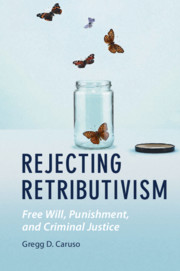Book contents
- Rejecting Retributivism
- Law and the Cognitive Sciences
- Rejecting Retributivism
- Copyright page
- Dedication
- Contents
- Acknowledgments
- 1 Free Will, Legal Punishment, and Retributivism
- 2 Free Will Skepticism
- 3 The Epistemic Argument against Retributivism
- 4 Additional Reasons for Rejecting Retributivism
- 5 Consequentialist, Educational, and Mixed Theories of Punishment
- 6 The Public Health–Quarantine Model I
- 7 The Public Health–Quarantine Model II
- 8 The Public Health–Quarantine Model III
- 9 The Public Health–Quarantine Model IV
- References
- Index
1 - Free Will, Legal Punishment, and Retributivism
Published online by Cambridge University Press: 06 May 2021
- Rejecting Retributivism
- Law and the Cognitive Sciences
- Rejecting Retributivism
- Copyright page
- Dedication
- Contents
- Acknowledgments
- 1 Free Will, Legal Punishment, and Retributivism
- 2 Free Will Skepticism
- 3 The Epistemic Argument against Retributivism
- 4 Additional Reasons for Rejecting Retributivism
- 5 Consequentialist, Educational, and Mixed Theories of Punishment
- 6 The Public Health–Quarantine Model I
- 7 The Public Health–Quarantine Model II
- 8 The Public Health–Quarantine Model III
- 9 The Public Health–Quarantine Model IV
- References
- Index
Summary
Within the criminal justice system one of the most prominent justifications for legal punishment, both historically and currently, is retributivism. The retributive justification of legal punishment maintains that, absent any excusing conditions, wrongdoers are morally responsible for their actions and deserve to be punished in proportion to their wrongdoing. Unlike theories of punishment that aim at deterrence, rehabilitation, or incapacitation, retributivism grounds punishment in the blameworthiness and desert of offenders. It holds that punishing wrongdoers is intrinsically good. For the retributivist, wrongdoers deserve a punitive response proportional to their wrongdoing, even if their punishment serves no further purpose. This means that the retributivist position is not reducible to consequentialist considerations nor in justifying punishment does it appeal to wider goods such as the safety of society or the moral improvement of those being punished.
- Type
- Chapter
- Information
- Rejecting RetributivismFree Will, Punishment, and Criminal Justice, pp. 1 - 34Publisher: Cambridge University PressPrint publication year: 2021

